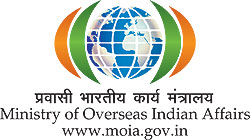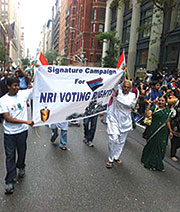|

NRI Voting Rights
|
|
|
The Election Commission of India has laid down clear guidelines and provisions for voting by Non-Resident Indians. We take a look at them.
 Eligibility:
Every Indian citizen who has attained the age of 18 years on the qualifying
date, i.e. on the 1st (first day) of January of the year of revision of electoral roll, unless otherwise disqualified, is eligible to be registered as a voter in the roll of the part / polling area of the constituency where he is ordinarily resident. Eligibility:
Every Indian citizen who has attained the age of 18 years on the qualifying
date, i.e. on the 1st (first day) of January of the year of revision of electoral roll, unless otherwise disqualified, is eligible to be registered as a voter in the roll of the part / polling area of the constituency where he is ordinarily resident.
Voter Registration: According to the provisions of the Representation of the People (Amendment) Act, 2010, a person who is a citizen of India and who has not acquired the citizenship of any other country is eligible to be registered as a voter. Also if he has been absent from his place of ordinary residence in India owing to his employment, education or otherwise, then he becomes eligible to be registered as a voter in the constituency in which his place of residence in India, as mentioned in his passport, is located.
Enrollment: A person cannot be enrolled as a voter in more than one place in view of the provisions contained under Section 17 and 18 of R.P. Act, 1950. Likewise, no person can be enrolled as an elector more than once in any electoral roll. An overseas Indian needs to file the application of enrolment as a voter in the prescribed form (6A) before the Electoral Registration Officer (ERO) of the constituency within which the place of ordinary residence of the applicant in India as given in his / her valid passport falls. The application can be presented in person before the ERO or sent by post addressed to the ERO concerned. If the application is sent by post, it must be accompanied by the copy of the passport and all relevant documents mentioned in Form 6A, duly attested by an officer of the Indian Mission in the country concerned.
Obtaining form 6A: It can be downloaded from the website of Election Commission of India. Form 6A is also available free of cost in Indian Missions in foreign countries and in the offices of EROs in India.
Documentation with 6A: One recent passport size coloured photograph, photocopy of relevant pages of the passport of the applicant containing his / her photograph and all other particulars and photocopy of the pages of passport containing the valid visa. If, the application is sent by post, the photo-copy of the documents referred to in the answer to question 7 above should be got duly attested by the competent official in the Indian Mission. If the application is submitted in person before the ERO, the original passport should be produced for verification.
Postal addresses of Electoral Registration Officer (ERO):
Postal addresses of all EROs are available on the website of Election Commission of India. They can also be obtained from Indian Missions in foreign countries.
List of claims and objections: It can be seen on the website of the CEO of the State concerned. It also can be seen on the notice board of the ERO.
Personal hearing: Normally personal appearance or hearing is not necessary. If all necessary documents duly attested by an officer of the Indian Mission are enclosed with the application, the ERO can include the name in the Electoral Roll after the statutory notice period of seven days is over. Application in form 6A can be sent by post. If an applicant, however, wishes to submit his application in person to the ERO, he can do so along with the original passport, which shall be returned to him after due verification and attestation of the documents by the ERO. In such a case, attestation of documents by an officer of the Indian Mission is not needed. In case there is an objection to the claim of inclusion of name, the ERO may designate an officer from the Mission concerned to hear the parties who will send a report to the ERO for final disposal.
Competent authority to verify claim applications and objections:
The ERO is the competent authority to verify claim applications and the accompanying documents and also consider objections, if any.
Finding out on name in electoral roll: The decision of the ERO will be communicated to the applicant by post at his address in the foreign country given by him in form 6A and also by SMS on the mobile number given by him in form 6A. Electoral Rolls are also available on the website of the Chief Electoral Officer of the State concerned in PDF format and can be seen by anybody. Names of overseas electors are included in the relevant part of the electoral roll of the constituency where his place of residence in India as mentioned in his passport is located. Within that relevant part, a separate section for “Overseas Electors” is created in the roll and names of overseas electors are kept in this section.
Name Correction: For correction of mistakes in Electoral Rolls, an application in Form-8 is to be submitted to the ERO concerned.
Objections to inclusion of names: Any person who is a voter in the concerned constituency may object to the inclusion of names in electoral roll on the ground that the person whose name is included, or is proposed to be included, is not eligible to be registered as a voter in that constituency. An objection can be made in Form 7 to the concerned ERO along with the relevant proof.
Change of Address: It is the responsibility of the overseas elector to keep the ERO informed of the change in residential address in the country of his / her residence.
Return to India: In such a case the person can then be registered as a general elector at the place where he is ordinarily resident in India.
Casting vote: After enrolment, an overseas elector will be able to cast his vote in an election in the Constituency, in person, at the polling station provided for the part where he is registered as an overseas elector.
|
|
|
|
|
|
August 2012
|
|


|
|
|
|
|
|